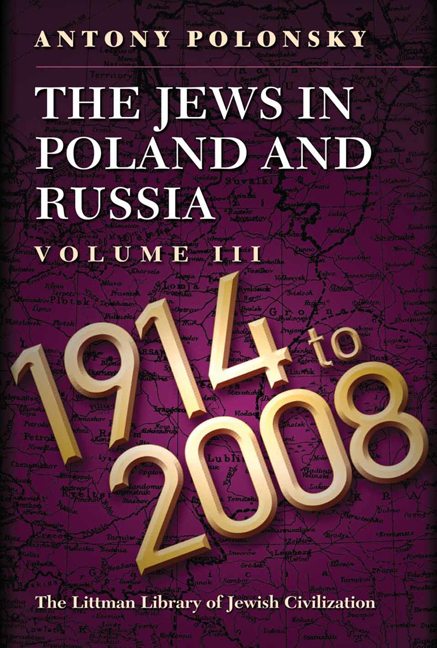Book contents
- Frontmatter
- Dedication
- Acknowledgements
- Contents
- List of Maps
- List of Tables
- Note on Transliteration
- Note on Place Names
- Maps
- General Introduction
- PART I FROM THE FIRST WORLD WAR TO THE SECOND
- PART II WAR AND GENOCIDE, 1939–1944
- PART III FROM THE END OF THE SECOND WORLD WAR TO THE COLLAPSE OF THE COMMUNIST SYSTEM
- EPILOGUE JEWS IN EASTERN EUROPE AND RUSSIA SINCE THE END OF COMMUNISM
- Conclusion
- Glossary
- Bibliography
- Index
7 - Jews in Soviet Russia and the Soviet Union, 1921–1941
- Frontmatter
- Dedication
- Acknowledgements
- Contents
- List of Maps
- List of Tables
- Note on Transliteration
- Note on Place Names
- Maps
- General Introduction
- PART I FROM THE FIRST WORLD WAR TO THE SECOND
- PART II WAR AND GENOCIDE, 1939–1944
- PART III FROM THE END OF THE SECOND WORLD WAR TO THE COLLAPSE OF THE COMMUNIST SYSTEM
- EPILOGUE JEWS IN EASTERN EUROPE AND RUSSIA SINCE THE END OF COMMUNISM
- Conclusion
- Glossary
- Bibliography
- Index
Summary
Pass on, pass on, you lonely grandfathers,
With frightened beards covered with snow,
In the last sorrow, in the final grief
You’re still here, the final witnesses.
Pass on, pass on, you lonely grandfathers!
… It's good to peer into your lonely eyes
When the sorrow of your beards is strange …
We—I and he and they—it is our fate,
It is our fate never to bow again.
Pass on, pass on, you lonely eyes.
IZI KHARIK, ‘Fargeyt, ir umetike zaydes’, 1925Espero—hope. We hoped that soon the forces fighting for the brotherhood of all men—for communism—would triumph throughout the world. And we believed that in our country … a national forum of different peoples and races had already been realized … Precisely for this reason our native land had become the fatherland of the labourers of the whole world.
LEV KOPELEV, The Education of a True Believer, 1980THE STUDY OF THE JEWS in the Soviet Union is a field that has been radically transformed in the years since the collapse of that state in 1991, with the ending of ideological constraints and the opening of archives. However, there are still many problems in relating the history of the Jews there. The Soviet system was highly centralized and, generally speaking, local developments reflect what was happening at the centre. The system was highly repressive, and many of the specific features of Jewish life—religion, independent schools, independent newspapers, different political orientations—were either illegal or strictly controlled by the Soviets. As a result, the record of how people reacted to the creation of the new political order is still difficult to reconstruct.
The Jewish experience of Soviet power altered considerably during the seventy years of communist rule. The 1920s saw the rapid integration of Jews into Soviet life and the flourishing of the attempt to create a Soviet Jewish culture based on Yiddish. The 1930s had many negative features, but most Jews still probably felt that their experience of the USSR was positive. The war years were mixed. On the one hand, the Jews were deeply conscious of popular hostility and the sympathy of significant elements within the population for what the Nazis were doing to the Jews.
- Type
- Chapter
- Information
- The Jews in Poland and RussiaVolume III: 1914 to 2008, pp. 239 - 273Publisher: Liverpool University PressPrint publication year: 2012



